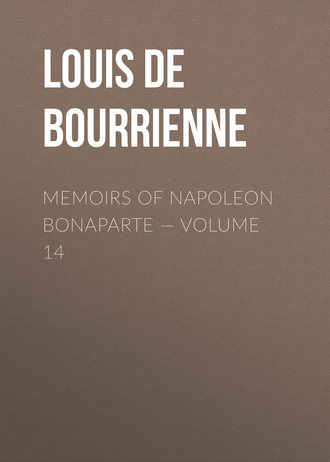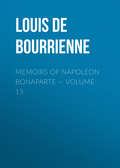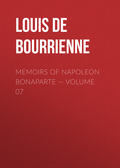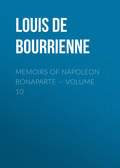
Louis de Bourrienne
Memoirs of Napoleon Bonaparte — Volume 14
CHAPTER X
1815
Interview with Lavallette—Proceedings in the French Chambers— Second abdication of Napoleon—He retires to Rochefort, negotiates with Captain Maitland, and finally embarks in the 'Bellerophon'.
One of the first public men to see Napoleon after his return from Waterloo was Lavallette. "I flew," says he, "to the Elysee to see the Emperor: he summoned me into his closet, and as soon as he saw me, he came to meet me with a frightful epileptic 'laugh. `Oh, my God!' he said, raising his eyes to heaven, and walking two or three times up and down the room. This appearance of despair was however very short. He soon recovered his coolness, and asked me what was going forward in the Chamber of Representatives. I could not attempt to hide that party spirit was there carried to a high pitch, and that the majority seemed determined to require his abdication, and to pronounce it themselves if he did not concede willingly. 'How is that?' he said. 'If proper measures are not taken the enemy will be before the gates of Paris in eight days. Alas!' he added, 'have I accustomed them to such great victories that they knew not how to bear one day's misfortune? What will become of poor France? I have done all I could for her!' He then heaved a deep sigh. Somebody asked to speak to him, and I left him, with a direction to come back at a later hour.
"I passed the day in seeking information among all my friends and acquaintances. I found in all of them either the greatest dejection or an extravagant joy, which they disguised by feigned alarm and pity for myself, which I repulsed with great indignation. Nothing favourable was to be expected from the Chamber of Representatives. They all said they wished for liberty, but, between two enemies who appeared ready to destroy it, they preferred the foreigners, the friends of the Bourbons, to Napoleon, who might still have prolonged the struggle, but that he alone would not find means to save them and erect the edifice of liberty. The Chamber of Peers presented a much sadder spectacle. Except the intrepid Thibaudeau, who till, the last moment expressed himself with admirable energy against the Bourbons, almost all the others thought of nothing else but getting out of the dilemma with the least loss they could. Some took no pains to hide their wish of bending again under the Bourbon yoke."
On the evening of Napoleon's return to Paris he sent for Benjamin Constant to come to him at the Elysee about seven o'clock. The Chambers had decreed their permanence, and proposals for abdication had reached the Emperor. He was serious but calm. In reply to some words on the disaster of Waterloo he said, "The question no longer concerns me, but France. They wish me to abdicate. Have they calculated upon the inevitable consequences of this abdication? It is round me, round my name, that the army rallies: to separate me from it is to disband it. If I abdicate to-day, in two days' time you will no longer have an army. These poor fellows do not understand all your subtleties. Is it believed that axioms in metaphysics, declarations of right, harangues from the tribune, will put a stop to the disbanding of an army? To reject me when I landed at Cannes I can conceive possible; to abandon me now is what I do not understand. It is not when the enemy is at twenty-five leagues' distance that any Government can be overturned with impunity. Does any one imagine that the Foreign Powers will be won over by fine words? If they had dethroned me fifteen days ago there would have been some spirit in it; but as it is, I make part of what strangers attack, I make part, then, of what France is bound to defend. In giving me up she gives up herself, she avows her weakness, she acknowledges herself conquered, she courts the insolence of the conqueror. It is not the love of liberty which deposes me, but Waterloo; it is fear, and a fear of which your enemies will take advantage. And then what title has the Chamber to demand my abdication? It goes out of its lawful sphere in doing so; it has no authority. It is my right, it is my duty to dissolve it."
"He then hastily ran over the possible consequences of such a step. Separated from the Chambers, he could only be considered as a military chief: but the army would be for him; that would always join him who can lead it against foreign banners, and to this might be added all that part of the population which is equally powerful and easily, led in such a state of things. As if chance intended to strengthen Napoleon in this train of thought, while he was speaking the avenue of Marigny resounded with the cries of 'Vive l'Empereur!' A crowd of men, chiefly of the poor and labouring class, pressed forward into the avenue, full of wild enthusiasm, and trying to scale the walls to make an offer to Napoleon to rally round and defend him. Bonaparte for some time looked attentively at this group. 'You see it is so,' said he; "those are not the men whom I have loaded with honours and riches. What do these people owe me? I found them—I left them—poor. The instinct of necessity enlightens them; the voice of the country speaks by their months; and if I choose, if I permit it, in an hour the refractory Chambers will have ceased to exist. But the life of a man is not worth purchasing at such a price: I did not return from the Isle of Elba that Paris should be inundated with blood: He did not like the idea of flight. 'Why should I not stay here?' he repeated. 'What do you suppose they would do to a man disarmed like me? I will go to Malmaison: I can live there in retirement with some friends, who most certainly will come to see me only for my own sake.'
"He then described with complacency and even with a sort of gaiety this new kind of life. Afterwards, discarding an idea which sounded like mere irony, he went on. 'If they do not like me to remain in France, where am I to go? To England? My abode there would be ridiculous or disquieting. I should be tranquil; no one would believe it. Every fog would be suspected of concealing my landing on the coast. At the first sign of a green coat getting out of a boat one party would fly from France, the other would put France out of the pale of the law. I should compromise everybody, and by dint of the repeated "Behold he comes!" I should feel the temptation to set out. America would be more suitable; I could live there with dignity. But once more, what is there to fear? What sovereign can, without injuring himself, persecute me? To one I have restored half his dominions; how often has the other pressed my hand, calling me a great man! And as to the third, can he find pleasure or honour in humiliation of his son-in-law? Would they wish to proclaim in the face of the world that all they did was through fear? As to the rest, I shall see: I do not wish to employ open force. I came in the hope of combining our last resources: they abandoned me; they do so with the same facility with which they received me back. Well, then, let them efface, if possible, this double stain of weakness and levity! Let them cover it over with some sacrifice, with some glory! Let them do for the country what they will not do for me. I doubt it. To-day, those who deliver up Bonaparte say that it is to save France: to-morrow, by delivering up France, they will prove that it was to save their own heads.'"
The humiliating scenes which rapidly succeeded one another; and which ended in Napoleon's unconditional surrender, may be briefly told. As soon as possible after his arrival at Paris he assembled his counsellors, when he declared himself in favour of still resisting. The question, however, was, whether the Chambers would support him; and Lafayette being treacherously informed, it is said by Fouche, that it was intended to dissolve the Chambers, used his influence to get the chambers to adopt the propositions he laid before them. By these the independence of the nation was asserted to be in danger; the sittings of the Chamber were declared permanent, and all attempts to dissolve it were pronounced treasonable. The propositions were adopted, and being communicated to the Chamber of Peers, that body also declared itself permanent. Whatever might have been the intentions of Bonaparte, it was now manifest that there were no longer any hopes of his being able to make his will the law of the nation; after some vacillation, therefore, on 22d June he published the following declaration:
TO THE FRENCH PEOPLE
FRENCHMEN!—In commencing war for maintaining the national independence, I relied on the union of all efforts, of all wills, and the concurrence of all the national authorities. I had reason to hope for success, and I braved all the declarations of the powers against me. Circumstances appear to me changed. I offer myself a sacrifice to the hatred of the enemies of France. May they prove sincere in their declarations, and really have directed them only against my power. My political life is terminated, and I proclaim my son under the title of:
NAPOLEON II.,
EMPEROR OF THE FRENCH
The present Ministers will provisionally form the Council of the Government. The interest which I take in my son induces me to invite the Chambers to form without delay the Regency by a law. Unite all for the public safety, that you may continue an independent nation.
(Signed) NAPOLEON.
This declaration was conveyed to both the Chambers, which voted deputations to the late Emperor, accepting this abdication, but in their debates the nomination of his son to the succession was artfully eluded. The Chamber of Representatives voted the nomination of a Commission of five persons, three to be chosen from that Chamber, and two from the Chamber of Peers, for the purpose of provisionally exercising the functions of Government, and also that the Ministers should continue their respective functions under the authority of this Commission. The persons chosen by the Chamber of Representatives were Carnot, Fouche, and Grenier, those nominated by the Peers were the Duke of Vicenza (Caulaincourt) and Baron Quinette. The Commission nominated five persons to the Allied army for the purpose of proposing peace. These proceedings were, however, rendered of little importance by the resolution of the victors to advance to Paris.
Napoleon's behaviour just before and immediately after the crisis is well described by Lavallette. "The next day," he observes, "I returned to the Emperor. He had received the most positive accounts of the state of feeling in the Chamber of Representatives. The reports had, however, been given to him with some little reserve, for he did not seem to me convinced that the resolution was really formed to pronounce his abdication, I was better informed on the matter, and I came to him without having the least doubt in my mind that the only thing he could do was to descend once more from the throne. I communicated to him all the particulars I had just received, and I did not hesitate to advise him to follow the only course worthy of him. He listened to me with a sombre air, and though he was in some measure master of himself, the agitation of his mind and the sense of his position betrayed themselves in his face and in all his motions. 'I know,' said I, 'that your Majesty may still keep the sword drawn, but with whom, and against whom? Defeat has chilled the courage of every one; the army is still in the greatest confusion. Nothing is to be expected from Paris, and the coup d'etat of the 18th Brumaire cannot be renewed.'—'That thought,' he replied, stopping, 'is far from my mind. I will hear nothing more about myself. But poor France!' At that moment Savary and Caulaincourt entered, and having drawn a faithful picture of the exasperation of the Deputies, they persuaded him to assent to abdication. Some words he uttered proved to us that he would have considered death preferable to that step; but still he took it.
"The great act of abdication being performed, he remained calm during the whole day, giving his advice on the position the army should take, and on the manner in which the negotiations with the enemy ought to be conducted. He insisted especially on the necessity of proclaiming his son Emperor, not so much for the advantage of the child as with a view to concentrate all the power of sentiments and affections. Unfortunately, nobody would listen to him. Some men of sense and courage rallied found that proposition in the two Chambers, but fear swayed the majority; and among those who remained free from it many thought that a public declaration of liberty, and the resolution to defend it at any price, would make the enemy and the Bourbons turn back. Strange delusion of weakness and want of experience! It must, however, be respected, for it had its source in love of their country; but, while we excuse it, can it be justified? The population of the metropolis had resumed its usual appearance, which was that of complete indifference, with a resolution to cry 'Long live the King!' provided the King arrived well escorted; for one must not judge of the whole capital by about one-thirtieth part of the inhabitants, who called for arms, and declared themselves warmly against the return of the exiled family.
"On the 23d I returned to the Elysee. The Emperor had been for two hours in his bath. He himself turned the discourse on the retreat he ought to choose, and spoke of the United States. I rejected the idea without reflection, and with a degree of vehemence that surprised him. 'Why not America?' he asked. I answered, 'Because Moreau retired there.' The observation was harsh, and I should never have forgiven myself for having expressed it; if I had not retracted my advice a few days afterwards. He heard it without any apparent ill-humour, but I have no doubt that it must have made an unfavourable impression on his mind. I strongly urged on his choosing England for his asylum.
"The Emperor went to Malmaison. He was accompanied thither by the Duchesse de St. Leu, Bertrand and his family, and the Duc de Bassano. The day that he arrived there he proposed to me to accompany him abroad. Drouot,' he said, 'remains in France. I see the Minister of War wishes him not to be lost to his country. I dare not complain, but it is a great loss for me; I never met with a better head, or a more upright heart. That man was formed to be a prime minister anywhere.' I declined to accompany him at the time, saying, 'My wife is enceinte; I cannot make up my mind to leave her. Allow me some time, and I will join you wherever you may be. I have remained faithful to your Majesty in better times, and you may reckon upon me now. Nevertheless, if my wife did not require all my attention, I should do better to go with you, for I have sad forebodings respecting my fate."
"The Emperor made no answer; but I saw by the expression of his countenance that he had no better augury of my fate than I had. However, the enemy was approaching, and for the last three days he had solicited the Provisional Government to place a frigate at his disposal, with which he might proceed to America. It had been promised him; he was even pressed to set off; but he wanted to be the bearer of the order to the captain to convey him to the United States, and that order did not arrive. We all felt that the delay of a single hour might put his freedom in jeopardy.







